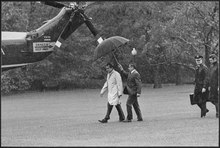
Richard Milhous Nixon was the 37th president of the United States, serving from 1969 until his resignation in 1974. A member of the Republican Party, he previously served as a representative and senator from California and as the 36th vice president from 1953 to 1961 under President Dwight D. Eisenhower. His presidency saw the reduction of U.S. involvement in the Vietnam War, détente with the Soviet Union and China, the Apollo 11 Moon landing, and the establishment of the Environmental Protection Agency and Occupational Safety and Health Administration. Nixon's second term ended early when he became the only U.S. president to resign from office, as a result of the Watergate scandal.

The Watergate scandal was a major political scandal in the United States involving the administration of President Richard Nixon which ultimately led to Nixon's resignation. It revolved around members of a fundraising organization associated with Nixon's 1972 re-election campaign breaking into the Democratic National Committee headquarters located in the Watergate Office Building in Washington, D.C., on June 17, 1972, and Nixon's subsequent attempts to conceal his administration's involvement.
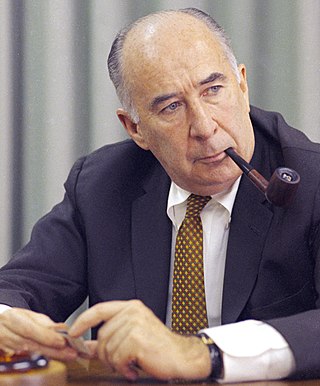
John Newton Mitchell was the 67th Attorney General of the United States, serving under President Richard Nixon and was chairman of Nixon's 1968 and 1972 presidential campaigns. Prior to that, he had been a municipal bond lawyer and one of Nixon's associates. He was tried and convicted as a result of his involvement in the Watergate scandal.

Patrick Joseph Buchanan is an American paleoconservative author, political commentator, and politician. Buchanan was an assistant and special consultant to U.S. presidents Richard Nixon, Gerald Ford, and Ronald Reagan. He is an influential figure in the modern paleoconservative movement in America.

Nixon is a 1995 American epic historical drama film directed by Oliver Stone, produced by Stone, Clayton Townsend, and Andrew G. Vajna, and written by Stone, Christopher Wilkinson, and Stephen J. Rievele, with significant contributions from "project consultants" Christopher Scheer and Robert Scheer. The film tells the story of the political and personal life of former U.S. President Richard Nixon, played by Anthony Hopkins.

Elliot Lee Richardson was an American lawyer and Republican politician. As a member of the cabinets of Richard Nixon and Gerald Ford between 1970 and 1977, Richardson is one of two men in United States history to hold four cabinet positions. As United States Attorney General, Richardson played a prominent role in the Watergate scandal when he resigned in protest against President Nixon's order to fire special prosecutor Archibald Cox. His resignation precipitated a crisis of confidence in Nixon which ultimately led to the president's resignation.

Thelma Catherine "Pat" Nixon was First Lady of the United States from 1969 to 1974 as the wife of President Richard Nixon. She also served as the second lady of the United States from 1953 to 1961 when her husband was vice president.

Louis Patrick Gray III was acting director of the Federal Bureau of Investigation (FBI) from May 3, 1972, to April 27, 1973. During this time, the FBI was in charge of the initial investigation into the burglaries that sparked the Watergate scandal, which eventually led to the resignation of President Nixon. Gray was nominated as permanent Director by Nixon on February 15, 1973, but failed to win Senate confirmation. He resigned as Acting FBI director on April 27, 1973, after he admitted to destroying documents that had come from convicted Watergate conspirator E. Howard Hunt's safe—documents received on June 28, 1972, 11 days after the Watergate burglary, and given to Gray by White House counsel John Dean.

Julie Nixon Eisenhower is an American author who is the younger daughter of former U.S. president Richard Nixon and his wife, Pat Nixon. Her husband, David, is the grandson of former U.S. president Dwight D. Eisenhower and his wife, Mamie Eisenhower.

The Kitchen Debate was a series of impromptu exchanges through interpreters between U.S. Vice President Richard Nixon and Chairman of the Council of Ministers Nikita Khrushchev, at the opening of the American National Exhibition at Sokolniki Park in Moscow on July 24, 1959.
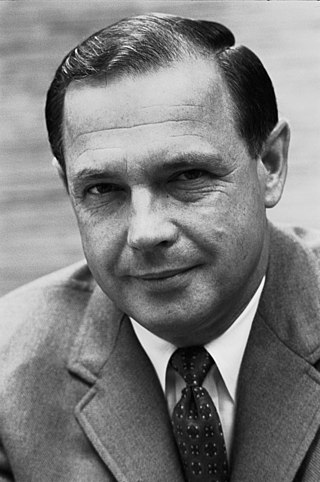
Alexander Porter Butterfield is a retired United States Air Force officer, public official, and businessman. He served as the deputy assistant to President Richard Nixon from 1969 to 1973. He revealed the White House taping system's existence on July 13, 1973, during the Watergate investigation but had no other involvement in the scandal. From 1973 to 1975, he served as administrator of the Federal Aviation Administration.

Patricia Nixon Cox is the elder daughter of the 37th United States president Richard Nixon and First Lady Pat Nixon, and the sister of Julie Nixon Eisenhower.
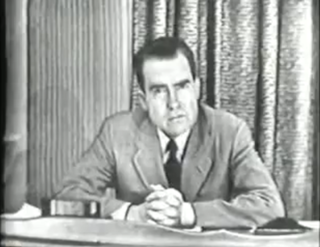
The Checkers speech or Fund speech was an address made on September 23, 1952, by Senator Richard Nixon (R-CA), six weeks before the 1952 United States presidential election, in which he was the Republican nominee for Vice President. Nixon had been accused of improprieties relating to a fund established by his backers to reimburse him for his political expenses. His place was in doubt on the Republican ticket, so he flew to Los Angeles and delivered a half-hour television address in which he defended himself, attacked his opponents, and urged the audience to contact the Republican National Committee (RNC) to tell it whether he should remain on the ticket. During the speech, he stated that he intended to keep one gift, regardless of the outcome: a black-and-white Cocker Spaniel that his children had named Checkers, thus giving the address its popular name.
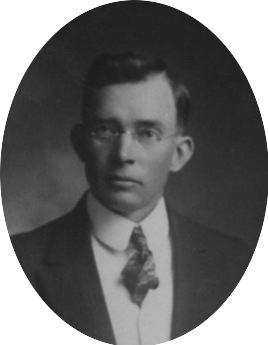
Francis Anthony Nixon was an American small business owner and the father of U.S. president Richard Nixon.

From February 21 to 28, 1972, United States President Richard Nixon visited the People's Republic of China (PRC) in the culmination of his administration's efforts to establish relations with the PRC after years of U.S. diplomatic policy that favored the Republic of China in Taiwan. His visit was the first time a U.S. president had visited the PRC, and his arrival in Beijing ended 25 years of no communication or diplomatic ties between the two countries. Nixon visited the PRC to gain more leverage over relations with the Soviet Union, following the Sino-Soviet split. The normalization of ties culminated in 1979, when the U.S. transferred diplomatic recognition from Taipei to Beijing and established full relations with the PRC.

Hannah Elizabeth Milhous Nixon was the mother of U.S. president Richard Nixon. Hannah's influence on her son was profound, and he frequently spoke about his admiration for his mother, including at his farewell speech to the White House staff.

The 1962 California gubernatorial election was held on November 6, 1962. The Democratic incumbent, Pat Brown, ran for re-election against former U.S. vice president and 1960 Republican presidential nominee Richard Nixon. In his concession speech the following morning, Nixon accused the media of favoring his opponent Brown, stating that it was his "last press conference" and "You won't have Nixon to kick around any more." Six years later, Nixon was elected President of the United States, and exactly ten years after this press conference he was re-elected in a landslide.

"Bring Us Together" was a political slogan popularized after the election of Republican candidate Richard Nixon as President of the United States in the 1968 election. The text was derived from a sign which 13-year-old Vicki Lynne Cole stated that she had carried at Nixon's rally in her hometown of Deshler, Ohio, during the campaign.

Proclamation 4311 was a presidential proclamation issued by President of the United States Gerald Ford on September 8, 1974, granting a full and unconditional pardon to Richard Nixon, his predecessor, for any crimes that he might have committed against the United States as president. In particular, the pardon covered Nixon's actions during the Watergate scandal. In a televised broadcast to the nation, Ford, who had succeeded to the presidency upon Nixon's resignation, explained that he felt the pardon was in the best interests of the country and that the Nixon family's situation was "a tragedy in which we all have played a part. It could go on and on and on, or someone must write the end to it. I have concluded that only I can do that, and if I can, I must."

In the early hours of May 9, 1970, President Richard Nixon made an unplanned visit to the Lincoln Memorial where he spoke with anti-war protesters and students for almost two hours. The protesters were conducting a vigil in protest of Nixon's recent decision to expand the Vietnam War into Cambodia and the recent deaths of students in the Kent State shootings.
